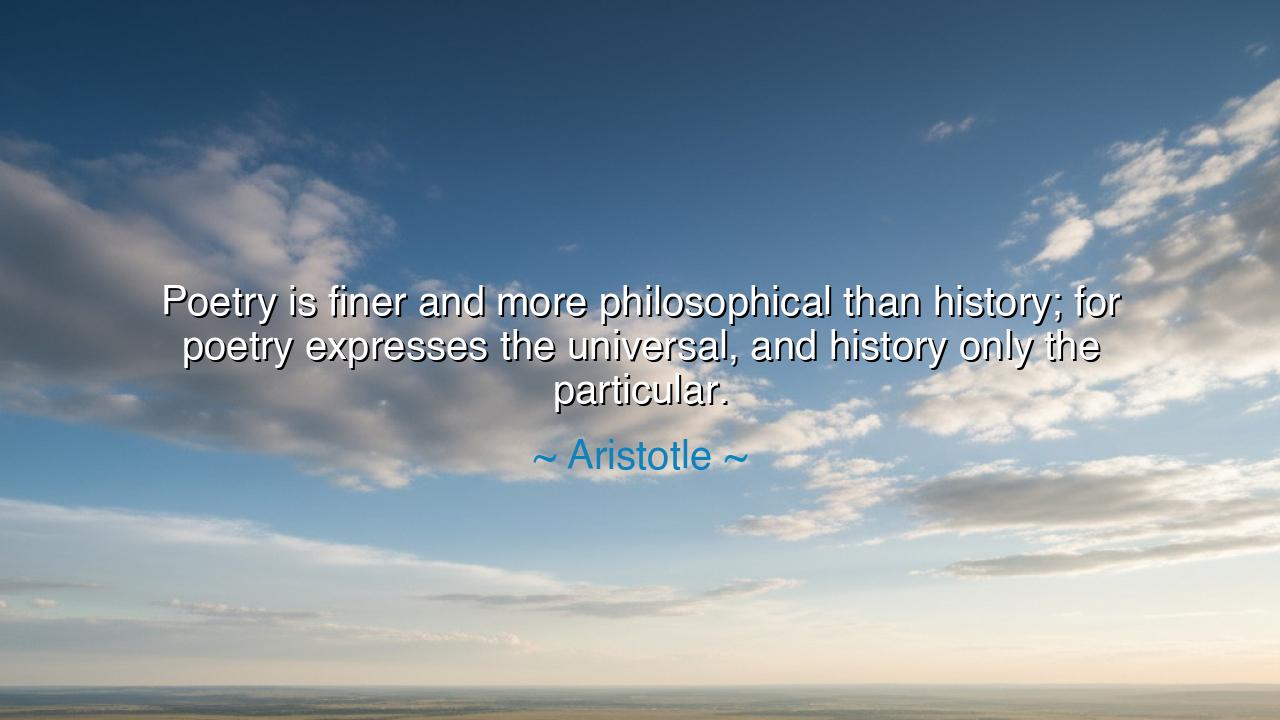
Poetry is finer and more philosophical than history; for poetry
Poetry is finer and more philosophical than history; for poetry expresses the universal, and history only the particular.






“Poetry is finer and more philosophical than history; for poetry expresses the universal, and history only the particular.” – Aristotle
Thus spoke Aristotle, the ancient master of wisdom, whose words still echo through the ages like the tolling of a timeless bell. In this saying, he reveals the secret power of poetry, a power that transcends mere record or event. For while history tells us what happened, poetry tells us what it means to be human. History deals with facts—names, places, dates—but poetry deals with truth, with the inner essence of things, the universal heart that beats within every man, woman, and nation. Aristotle, the philosopher of reason, here bows to the soul’s imagination, declaring that art, not record, brings us closer to understanding life’s deeper laws.
The origin of these words can be found in Aristotle’s treatise, The Poetics, written more than two millennia ago. In it, he examined the nature of tragedy, epic, and song, seeking to understand why poetry moves us so deeply. He saw that history is bound to the particular—it tells of one man, in one place, at one time. But poetry, through rhythm and symbol, speaks to all men, in all times. A poem about one hero’s fall becomes a reflection of every human struggle; a verse about one lover’s loss speaks to all who have loved and lost. Thus, poetry is not lesser than philosophy—it is philosophy, expressed not in argument, but in feeling; not through logic, but through beauty.
Consider the example of Homer, the poet of Greece. His Iliad and Odyssey are not historical chronicles—indeed, historians debate whether the Trojan War even happened as he described it. Yet Homer's verses have endured for thousands of years because they reveal something far more enduring than fact: the universal truths of courage, pride, loyalty, and fate. Achilles’ rage and Odysseus’s longing for home are not confined to ancient times; they are the passions of every heart, the struggles of every soul. History might tell us the sequence of wars, but poetry shows us why men go to war at all.
Aristotle’s insight is that the universal is the essence of wisdom. To know one man’s story is knowledge; to see in that story the reflection of all mankind is understanding. History tells us that Caesar was betrayed by Brutus, but poetry tells us of the eternal conflict between friendship and power, loyalty and ambition. History records the crucifixion of Christ; poetry captures the meaning of sacrifice, redemption, and divine love. The philosopher seeks truth through thought, but the poet finds it through vision. In this way, Aristotle teaches that poetry, in touching the eternal, becomes the highest form of philosophy—the contemplation of what it means to live, to suffer, to hope, and to dream.
We see this truth echoed in every age. When Shakespeare wrote of kings and clowns, his tales were not history, though they drew from it; they were the poetry of existence itself. Hamlet is not merely the story of a Danish prince—it is the mirror of the human condition, the eternal question of action and doubt, of the search for meaning in a world of shadows. So too did Dante, in his Divine Comedy, turn his own journey into a cosmic one, charting the soul’s path from sin to salvation. The poet thus becomes both historian and prophet: historian of the soul, prophet of the spirit.
Aristotle’s words also offer a lesson for our own time, when the world is flooded with information but starved of meaning. We record everything—we chronicle events, we measure data—but still, we ask: what does it all mean? History alone cannot answer that question, for it speaks of the outer world. Poetry, whether written in verse or expressed through music, art, or empathy, reveals the inner world—the universal within the particular. It reminds us that beneath the surface of all things lies a shared essence, a divine unity that connects us all.
So, my child of the present age, take this teaching into your heart: do not live only by history, but also by poetry. Learn the facts of the world, but seek also the meanings behind them. When you read of great deeds, ask what they reveal about the human spirit. When you hear of suffering, listen for the song of endurance that runs beneath it. For history shows us what has been, but poetry teaches us what always is. And those who see the universal in the particular will never be lost, for they walk not upon the shifting sands of time, but upon the eternal ground of truth.
Thus, as Aristotle declared, poetry is finer and more philosophical than history, because it is not bound by the accidents of circumstance. It is the language of the soul itself—ever ancient, ever new—and through it, humanity remembers not only what has happened, but what it means to be alive.






AAdministratorAdministrator
Welcome, honored guests. Please leave a comment, we will respond soon